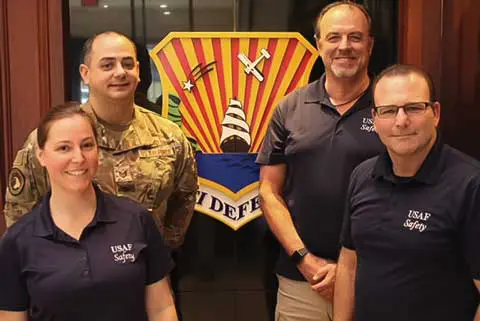AMC OUTSTANDING ACHIEVEMENT AWARD FOR OCCUPATIONAL SAFETY, CATEGORY III
6th AIR REFUELING WING
MacDill Air Force Base, FL
By Staff Writer
THE 6th AIR REFUELING WING (6 ARW) OCCUPATIONAL SAFETY OFFICE, MacDill Air Force Base, FL, has received the Air Mobility Command (AMC) Outstanding Achievement Award for Occupational Safety, Category III.
The Occupational Safety office directed a Hazard Abatement Plan, in which nearly 400 inspections were completed, and 183 discrepancies were corrected. The wing also zeroed out the hazard abatement log—the first time this has occurred in a decade. Overall, the mishap cost was reduced by 49 percent in fiscal year 2022.
The Occupational Safety team excelled at managing a hangar fire suppression project. They audited a $1 million design plan and rescue training for personnel, which eliminated three hazards for aircraft totaling $1.3 billion.
The team of safety subject matter experts evaluated an AGILE COMBAT exercise, in which 53 missions, 23 hot pit refuels, and 643,000 gallons in fuel transfers were evaluated, which crushed the KC-135 operations and maintenance record—all with zero mishaps.
Team members set their sights high when they validated a maintenance safety audit and documented 41 industrial personal protective equipment spot inspections—surpassing AMC’s goal by 160 percent.
Occupational Safety members evaluated the Base Civil Engineer Work Request Review Board, and approved and processed 379 projects worth over $17 million. This action improved facilities and flight line safety for 30,000 personnel.
The Occupational Safety office seamlessly led 24/7, real-world hurricane response team support. It published critical evacuation messages and protected over 30,000 personnel and $3.3 billion in assets.
Traffic safety efforts continued by the team sponsoring a Critical Days of Summer campaign. It led three commander-directed events with over 30,000 personnel—perpetuating the streak of zero fatalities for nearly two decades.
No stone was left unturned as Occupational Safety personnel shifted their safety mindset toward all-terrain vehicle (or ATV) driving. They approved an ATV driving course and ensured environmental and safety standards were met, which saved 26 man-hours and protected ATV riders.

